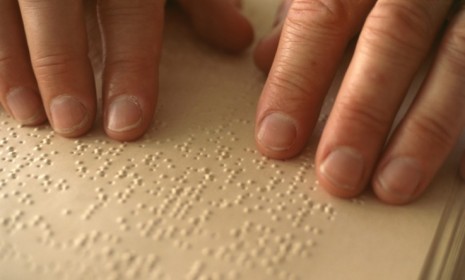Are smartphones killing Braille?
A raft of fancy new gadgets let blind people listen to text. Is this contributing to "Braille illiteracy"?

A free daily email with the biggest news stories of the day – and the best features from TheWeek.com
You are now subscribed
Your newsletter sign-up was successful
For 200 years, Braille has helped people without eyesight to read and live more independently. But some educators now fear that smartphones and other new technologies have made it easier for young people to get by without learning the system, leading to a surge in "Braille illiteracy." How serious is the problem? Here, a brief guide:
How was Braille invented?
Braille — an alphabet in which each letter is represented by a unique pattern of raised dots that the blind can read by touch — was developed by Louis Braille in France in 1821. Inspired by a failed military "night writing" code, his revolutionary system allowed blind people to read independently for the first time in history. Braille was widely adopted among blind people in the 19th and early 20th centuries. As governments encourage or require the system in more and more public settings (especially in Europe), Braille letters can be found on everything from elevator control panels to restaurant menus.
The Week
Escape your echo chamber. Get the facts behind the news, plus analysis from multiple perspectives.

Sign up for The Week's Free Newsletters
From our morning news briefing to a weekly Good News Newsletter, get the best of The Week delivered directly to your inbox.
From our morning news briefing to a weekly Good News Newsletter, get the best of The Week delivered directly to your inbox.
How many Americans use Braille?
These days, only about 10 percent of blind people can read it, a significant drop from the early 1900s. The decline began years ago as recorded materials became increasingly available. "When am I ever going to use Braille? I'm never going to sit down and read a novel in Braille," Jackie Owellet, who lost her sight as an adult, tells NPR. "You know, I'd rather download an audio book from iTunes."
And smartphones are contributing to this decline?
Absolutely. With the rise in smartphones, which can be equipped with screenreaders that turn text into spoken language, the decline in Braille literacy is accelerating.
A free daily email with the biggest news stories of the day – and the best features from TheWeek.com
So will smartphones mean the end of Braille?
It's too early to say for sure. But there is a twist: iPhones and iPads also have the potential to make Braille more accessible than ever. Compact electronic "Braille Displays" (connected to a screen via Bluetooth) can translate digital characters into Braille using grids of plastic nubs that rise and fall as the text progresses (See a demonstration video here.) "The iPhone is the official phone of blindness," one blind woman tells Britain's Guardian.
-
 Political cartoons for February 21
Political cartoons for February 21Cartoons Saturday’s political cartoons include consequences, secrets, and more
-
 Crisis in Cuba: a ‘golden opportunity’ for Washington?
Crisis in Cuba: a ‘golden opportunity’ for Washington?Talking Point The Trump administration is applying the pressure, and with Latin America swinging to the right, Havana is becoming more ‘politically isolated’
-
 5 thoroughly redacted cartoons about Pam Bondi protecting predators
5 thoroughly redacted cartoons about Pam Bondi protecting predatorsCartoons Artists take on the real victim, types of protection, and more